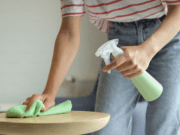Have you ever wondered why vinegar is often recommended as a go-to cleaning solution?
It’s not just because it’s a cheaper alternative to commercial cleaning products.
Vinegar is a versatile, eco-friendly, and highly effective cleaning agent that can tackle a wide range of household chores.
Let’s delve into the reasons why vinegar is so good for household cleaning.
The Science Behind Vinegar
Vinegar is essentially a diluted form of acetic acid. This acid has the ability to break down grime, dirt, and bacteria, making it an excellent cleaning agent.
When vinegar comes into contact with surfaces, it breaks down the molecular structures of stains and dirt, making them easier to wipe away.
This is why vinegar is often used for tough cleaning tasks like removing hard water stains or cleaning ovens.
Vinegar is Eco-Friendly
Unlike many commercial cleaning products, vinegar is non-toxic and biodegradable. This means it’s safe for the environment and for your family. You don’t have to worry about harmful chemicals contaminating your home or the planet.
Using vinegar also reduces plastic waste, as you can buy it in bulk and refill your own spray bottles, rather than buying new plastic bottles each time you need more cleaning solution.
Vinegar is Versatile
One of the best things about vinegar is its versatility.
It can be used to clean a wide range of items and surfaces in your home.
From kitchen countertops and bathroom tiles to windows and mirrors, vinegar can do it all.
Vinegar is also great for deodorizing. If you have a bad smell in your home, vinegar can help neutralize it.
Just leave a bowl of vinegar in the room overnight, and the smell should be gone by morning.
Vinegar is Cost-Effective
Another reason why vinegar is a great choice for household cleaning is its cost-effectiveness. Vinegar is significantly cheaper than most commercial cleaning products.
Since it’s so versatile, you can use it for a variety of cleaning tasks, saving you even more money.
Vinegar Cleaning Do’s and Don’ts
There are some important do’s and don’ts to keep in mind to ensure safe and efficient cleaning:
Do’s:
Dilute vinegar: Vinegar is highly acidic, so it’s essential to dilute it with water for most cleaning tasks. A common ratio is one part vinegar to one part water, but you can adjust the strength based on your needs.
Use white vinegar. White distilled vinegar is the most commonly used type for cleaning. It has a mild scent and is less likely to stain surfaces.
Test in an inconspicuous area: Before applying vinegar to a new surface, test a small, hidden area to ensure it won’t damage or discolor the material.
Clean glass and windows: Vinegar is excellent for cleaning glass and windows. Mix it with water and use a lint-free cloth or paper towel for streak-free results.
Descale appliances: Use vinegar to remove mineral deposits in appliances like coffee makers, kettles, and dishwashers. Run a vinegar and water solution through the appliance, followed by several water rinses.
Deodorize and disinfect: Vinegar can help neutralize odors and disinfect surfaces. It’s particularly useful for cutting through pet odors and germs.
Remove stains: Vinegar can be effective in removing various stains, such as coffee, tea, and red wine. Blot the stain with a mixture of vinegar and water, then rinse with cold water.
Clean your microwave: Heat a bowl of vinegar and water in the microwave to help soften and remove food splatters and stains. Then wipe down the interior.
Don’ts:
Don’t ever mix vinegar with bleach. Never mix vinegar with products containing bleach. The combination can produce harmful fumes.
Don’t use vinegar on natural stone: Avoid using vinegar on natural stone surfaces like granite, marble, and limestone, as it can etch and damage the stone. Use a stone-specific cleaner instead.
Don’t use vinegar on hardwood floors: Vinegar can strip the finish from hardwood floors and damage the wood. Instead, use a manufacturer-recommended cleaner for wood floors.
Don’t use vinegar on cast iron: Vinegar can strip the seasoning from cast iron cookware. Use water and a brush to clean cast iron pans, and then promptly dry and re-season them.
Don’t use on aluminum or copper: Vinegar can corrode aluminum and copper surfaces. Choose alternative cleaning methods for these materials.
Don’t use on electronics: Avoid using vinegar on electronic devices, as it can damage sensitive components and screens.
Don’t overuse on wood furniture: While vinegar can be used to clean wood furniture occasionally, using it too frequently may remove the furniture’s polish or finish.
Don’t use on fabrics without testing: Before using vinegar to remove stains on fabric, test it in an inconspicuous area to ensure it won’t affect the color or texture of the fabric.
Remember that while vinegar is a versatile and eco-friendly cleaning agent, it may not be suitable for all surfaces. Always exercise caution and ensure that it won’t harm the material you’re cleaning.




